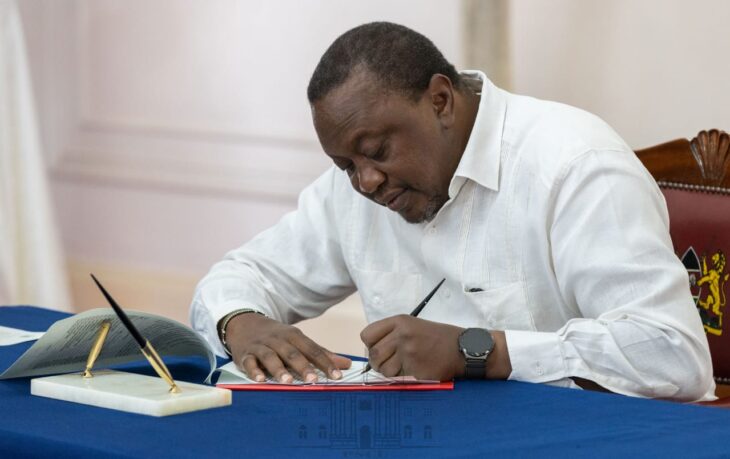NAIROBI, Kenya, Apr 7- National Treasury Cabinet Secretary on Thursday delivered President Uhuru Kenyatta’s last budget, amidst an economic meltdown coupled with a high cost of living.
Yatani read the budget statement in parliament, where he broke down how the Sh3.3 trillion budget will be executed to manage the nation in the next financial year of 2022/2023.
The 2022/23 budget marks an increase from the Sh3.1 trillion approved in June for the financial year 2021/22.
This year’s budget was read two months before the end of the 2021/22 financial year due to the August 9th polls elections calendar.
The budget saw key economic sectors allocated the lion’s share of the Sh3.3 trillion and more so those under President Kenyatta’s Big Four Agenda.
To ensure the country is safe and stable, the Treasury Cabinet Secretary allocated Sh317.8 billion to the National Security agencies.
CS Yattani said funds will support the operations of the National Police Service, the Department of Defence, and the National Intelligence Service towards enhancing security.
“The security of our nation remains paramount and must be maintained to safeguard the considerable development gains,” he said.
Kenya continues to face a myriad of security challenges, with terrorism posing the biggest threat.
With high youth unemployment, the government has to work overtime, to ensure the country’s majority population is not recruited into terror groups or radicalized, even as it plans to create more jobs.
In the budget estimates, Sh128.4 billion will go to the Ministry of Defence, Sh46.4 billion to the National Intelligence Service, and Sh122. 2 billion to the police and prison services.
Some Sh10.7 billion will go towards the leasing of police motor vehicles and Sh1 billion for the police modernization program.
An additional Sh1 billion will finance the National Communication and Surveillance System and Sh335 million will be used for the equipment of the National Forensic Laboratory.
Other proposed allocations include Sh4.8 billion for the medical insurance for police and prison service, 2.3 billion for group personal insurance for police and prison, and Sh1 billion for the national integrated identity management system.
-Big Four Agenda-
Yattani proposed the allocation of Sh146.8 billion to support the implementation of the projects and programmes under the Big 4 agenda.
The Big 4 Agenda, comprises Food Security; Affordable Housing; Manufacturing and Affordable Healthcare.
As Uhuru leaves the State House after a 10-year tenure, the Cabinet Secretary said the government was keen on reviving the country’s ailing economy and implementing the Big Four Agenda projects.
Most of the programmes under the Big Four agenda contain legacy projects for the president.
-The Education Sector-
The education sector has been allocated a whopping Sh544.4 billion, in the budget estimates presented to parliament by CS Yattani.
Of the amount, Sh12 billion was allocated to the Free Primary Education programme, while Sh64.4 billion goes to cater to the Free Day Secondary School Education programme.
Some Sh5 billion will be allocated for the examination fee waiver while Sh1.2 billion will be used for the training of teachers.
The education sector is currently undergoing major reforms, with the change of curriculum from 8.4.4 to 2.6.3.3.3.
Other than the change in the number of years in each level, national exams will be scrapped off once it is fully rolled out.
Students will be assessed in a continuous manner. Teachers will become more than just instructors because more teaching methodologies will be used.
Students’ skills and abilities will also be developed in the new system as they will be exposed to life skills from pre-primary. Some of these skills will include psycho-social and interpersonal skills.
At the senior level, students will be exposed to community service and physical education.
The interesting thing about the new system is that parents and the community will be involved at one level or another. For instance, parents may identify an opportunity where the students may increase their knowledge. This means the parental role will be important in the education of the child.
8.4.4 System is exam-oriented but the trend may be changing. Students will be more involved in learning.
Content will be retained as most sessions will be interactive.
-Health Care-
The Treasury Cabinet Secretary further allocated Sh146.8 billion to cater for health care services in the 2022/2023 budget.
“Better health care outcomes depend on the availability, accessibility and capacity of health care workers to deliver quality services anchored on well equipped and provision health care facilities,” he said.
He assured that the government is committed “towards achieving the goal of achieving 100 percent health insurance coverage”.
“Key among these initiatives include the free maternity program dubbed linda mama which currently benefits over 1 million mothers annually increasing the total number of health workers in the public and private sector investment in the health infrastructure and development of a digital health platform support effective monitoring of the health sector,” he said.
Of the amount allocated to the health sector, Sh62.3 billion will fund activities and programs for the attainment of Universal coverage.
Some sh7 billion was allocated to purchase COVID-19 vaccines and related expenditures.
He said Sh4.1 billion will finance the free maternity health care programme.
Some Sh5.2 billion will go towards the Managed Equipment Services while Sh1.8 billion will cater for the medical cover for the elderly and severely disabled persons in society.
To lower cases of HIV AIDS, Malaria, and tuberculosis in the country, Sh16.2 billion was allocated with Sh5.2 billion set aside to enhance vaccines and immunization program.
Various hospitals across the country were also allocated funds with the Kenyatta National Hospital being the biggest beneficiary after being getting Sh18.1 billion.
Want to send us a story? Contact Shahidi News Tel: +254115512797 (Mobile & WhatsApp)


